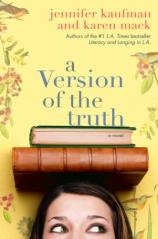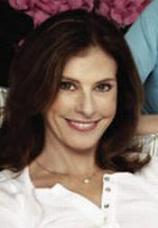Interview: February 8, 2008
February 8, 2008
In this interview with Bookreporter.com's Cindy Crosby, Jennifer Kaufman and Karen Mack --- authors of the critically acclaimed LITERACY AND LONGING IN L.A. --- describe their latest novel, A VERSION OF THE TRUTH, as a sort of Pygmalion tale in which their own Eliza Doolittle character, Cassie Shaw, manages to turn her life around by inventing a new reality for herself.
They also explain how writing in a first-person point of view added depth to their protagonist, discuss the role that nature plays in the narrative and share ideas for their possible third collaboration.
Bookreporter.com: How did you come to write A VERSION OF THE TRUTH?
Jennifer Kaufman and Karen Mack: Both of us are drawn to characters who, for various reasons, feel isolated or apart from society --- quirky but likable misfits forced to reinvent themselves in order to survive. So we decided to write a transformational story set in contemporary times and focus on a woman who basically feels she has no options to change her life. It’s the way many of us feel at one time or another. So we wait for a miracle, or a winning lottery ticket, or a convenient mishap. It takes a lot of nerve to alter one’s destiny, and that’s what Cassie has --- a lot of nerve. She tells a little white lie that ultimately throws her into a whole new world, and the impact of that affects the rest of her life. Kurt Vonnegut once wrote, “You are who you pretend to be,” and that is the basic theme of this book. There are so many ways one can interpret that quote, from George Bernard Shaw’s classic play Pygmalion to all the self-help theories of how to lead a better life. But in the end, the ephemeral quality of the truth is still all-pervasive --- is the moth really the butterfly, or is the butterfly really the moth?
BRC: Cassie Shaw is very much a late bloomer. What made you sympathetic to the idea of a woman who is so far behind socially and educationally?
JK & KM: We wanted to give our character the kind of handicap Eliza Doolittle had in Pygmalion, but to make it more of a real disability rather than an issue of class. Eliza has a cockney accent that gives away her “lower status” in Victorian society, and our heroine Cassandra has dyslexia. Both women are strong, intelligent and determined to improve their lot in life. But both have moments of serious self-doubt. It seems to us that so many women still lead lives of quiet desperation because they feel they aren’t good enough. So why not dream up a character who invents a new reality for herself --- a version of the truth --- and then unwittingly turns her whole life around?
BRC: Why did you decide to have Cassie deliver a first-person point of view? How would the story have changed if it were told in third person?
JK & KM: We wanted the perspective to be from Cassie’s point of view to show just how damaged and insecure she was, but also to give the reader hints along the way that Cassie was often unaware of her strength and intelligence. In books like TO KILL A MOCKINGBIRD, where the narrator is a young girl, the world is filtered through the eyes of someone who is not mature enough to philosophize or put the actions of the other characters in perspective. First-person narrators force the reader to be more of an active participant in the story, especially if the protagonists aren’t telling you the whole story. As a reader, you have to figure out what is left out, who is telling the truth, and as a writer it is often more of a challenge to make the whole thing believable. Edgar Allan Poe does first person masterfully in his eerie little tales --- the horror sort of creeps up on the reader like a snake. Third person, in our story, would have given away too much of the mystery that eventually clouds up Cassie’s world.
BRC: Cassie’s hippie mom is one of the most endearing characters in your book. How did her character develop?
JK & KM: Cassie’s mother is modeled after Jennifer’s mother. Her quirky, Bigfoot excursions and vegan manias are for real. But Cassie’s mother is also typical of many residents who actually live in Topanga Canyon and carry on a simple, very un-L.A. type of life. Topanga Canyon is part of the Santa Monica Mountain range, 700 miles of wild terrain and the largest “city” park in the world. Many avid nature enthusiasts and bird watchers make their homes there.
BRC: Anyone in academia would recognize some of the quirky professor types and their followers in your book. Which academic character was the most fun to write about? Were any of the college scenes reminiscent of your own university days?
JK & KM: Before we started the book, we managed to get several different versions of student guides to college classes and professors, including “The Cue Guide” from Harvard. “The Cue Guide” is an analysis of professors and their courses from the student’s point of view, and it is at once hilarious and very descriptive of how certain professors give away their foibles and personal lives in their lectures. The limerick-spouting prof was based on a real man who also wrote dirty haikus! (For our next book…)
BRC: There is a particular focus on birds --- namely Cassie’s love for Sam, her pet parrot and the search for wild birds, especially the endangered Ivory Bill Woodpecker. Are either of you bird enthusiasts, or interested in wildlife?
JK & KM: We like to say that Karen is at two with nature. (That’s a Woody Allen line.) Jennifer is the bird enthusiast and has been all her life, but we both did about six months of research for this book before we wrote it and then became mesmerized with the whole enigma of the Ivory Billed Woodpecker. This bird is the only species in nature in which the scientific community is still not sure whether it exists or not. It is one of the last, true mysteries in nature.
BRC: What conclusions about honesty do you hope to draw in A VERSION OF THE TRUTH?
JK & KM: We try to show in the novel that in essence, the truth is ephemeral --- a slippery, sliding slope. The classic nature writers of the 19th century such as Emerson, Thoreau, Muir and Whitman believed that the only truth was in nature --- and that’s why we make Cassie such a nature enthusiast. Because even though she wasn’t aware of it, she felt the most comfortable and the most powerful when she was in the wild, like Emerson; she felt she could perform miracles. But even in nature, the truth isn’t always so easy to find.
BRC: Your debut novel, LITERACY AND LONGING IN L.A., got great reviews. How did this impact your expectations writing your second novel?
JK & KM: We were in the unique position of having a two-book deal and so we were basically writing the second book while promoting the first. You try not to be influenced by other people’s opinions of your work, but naturally, favorable reviews keep you motivated and inspire you to keep on writing.
BRC: Karen, what are the differences and similarities between writing fiction and working in film and television?
KM: I think my experience with film and TV has helped me enormously with dialogue that sounds authentic. I am also keenly sensitive to the pace, structure and action.
BRC: Do you both have another novel in the works?
JK & KM: We are currently working on several different ideas, and meanwhile, we are on tour with this book. The idea of a woman who escapes into books (LITERACY AND LONGING IN L.A.), nature (A VERSION OF THE TRUTH) and now, maybe, the ocean, may be an option.





